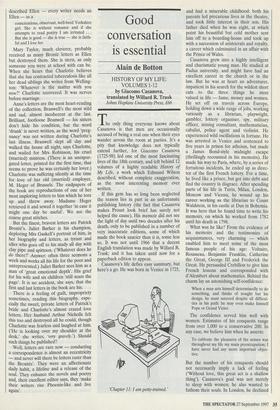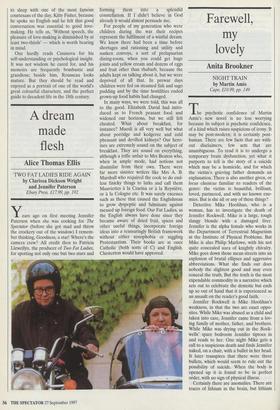Good conversation is essential
Alain de Botton
HISTORY OF MY LIFE: VOLUMES 1-12 by Giacomo Casanova, translated by Willard R. Trask Johns Hopkins University Press, f66 The only thing everyone knows about Casanova is that men are occasionally accused of being a real one when their eyes wander across the room at parties. It's a pity that knowledge does not typically extend further, for Giacomo Casanova (1725-98) led one of the most fascinating lives of the 18th century, and left behind 12 volumes of a highly readable History of My Life, a work which Edmund Wilson described, without complete exaggeration, as the most interesting memoir ever written.
If this gem has so long been neglected the reason lies in part in an unfortunate publishing history (the fact that Casanova makes Proust look brief has surely not helped the cause). His memoir did not see the light of day until two decades after his death, only to be published in a number of very inaccurate editions, some of which made the book saucier than it is, some less so. It was not until 1966 that a decent English translation was made by Willard R. Trask; and it has taken until now for a paperback edition to appear.
Casanova's life defies easy summary, but here's a go. He was born in Venice in 1725, `Chapter 11: am potty-trained.' and had a miserable childhood: both his parents led precarious lives in the theatre, and took little interest in their son. His father died when he was eight, at which point his beautiful but cold mother sent him off to a boarding-house and took up with a succession of aristocrats and royalty, a career which culminated in an affair with the Prince of Wales.
Casanova grew into a highly intelligent and charismatic young man. He studied at Padua university, and might have had an excellent career in the church or in the law. But he was at heart an adventurer, impatient in his search for the wildest short cuts to the three things he most valued in life — fame, money and women. He set off on travels across Europe, holding down a wide range of jobs, working variously as a librarian, playwright, gambler, lottery organiser, spy, military officer, mining consultant, mathematician, cabalist, police agent and violinist. He experienced wild oscillations in fortune. He was arrested in Venice and sentenced to five years in prison for atheism, but made a James Bond-style midnight escape (thrillingly recounted in his memoirs). He made his way to Paris, where, by a series of fortuitous incidents, he ended up as direc- tor of the first French lottery. For a time, he lived like a prince, but got into debt and fled the country in disgrace. After spending parts of his life in Turin, Milan, London, Moscow and Vienna, he wound up his career working as the librarian to Count Waldstein, in his castle at Dux in Bohemia. It was here that he found time to write his memoirs, on which he worked from 1782 until his death in 1798.
What was he like? From the evidence of his memoirs and the testimonies of acquaintances, very charming — which enabled him to meet some of the most famous people of his age: Voltaire, Rousseau, Benjamin Franldin, Catherine the Great, George III and Frederick the Great. He persuaded Crebillon to give him French lessons and corresponded with d'Alembert about mathematics. Behind the charm lay an astonishing self-confidence:
When a man sets himself determinedly to do something, and thinks of nought but his design, he must succeed despite all difficul- ties in his path: he may even make himself Pope or Grand Vizier.
The confidence served him well with women. Estimates of his conquests range from over 1,000 to a conservative 200. In any case, we believe him when he asserts:
To cultivate the pleasures of the senses was throughout my life my main preoccupation; I have never had any more important objec- tive.
But the number of his conquests should not necessarily imply a lack of feeling (Without love, this great act is a shallow thing'). Casanova's goal was not merely to sleep with women; he also wanted to fathom their souls. In London, he declined to sleep with one of the most famous courtesans of the day, Kitty Fisher, because he spoke no English and he felt that good conversation was essential to good love- making. He tells us, 'Without speech, the pleasure of love-making is diminished by at least two-thirds' — which is worth bearing in mind.
One hardly reads Casanova for his self-understanding or psychological insight. It was not wisdom he cared for, and his memoirs are frequently bombastic and grandiose; beside him, Rousseau looks mature. But they should be read and enjoyed as a portrait of one of the world's great colourful characters, and the perfect guide to decadent life in the 18th century.











































































 Previous page
Previous page